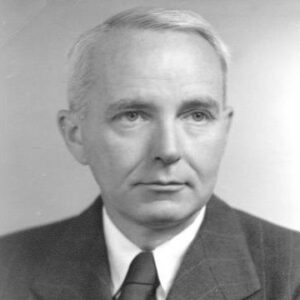Huggins, a Canadian-born American physician, surgeon, and physiologist, won the Nobel Prize in Physiology or Medicine in 1966 for his work on using hormones to control the development of cancer. Huggins’ groundbreaking discovery that chemicals can be used to stop the growth of this lethal disease ushered in a new age of medication therapy that paved the way for advanced prostate and breast cancer treatment. He studied cancer and directed the ‘Ben May Laboratory for Cancer Research’ at the ‘University of Chicago’ for nearly two decades. He was a male urology and genital tract specialist who discovered that by administering amounts of estrogen, the male hormone’s effects can be inhibited, slowing the progression of prostate cancer. His research also revealed the hormone dependence of breast tumors. Some of his patients’ tumors regressed when he removed their estrogen-producing adrenal glands and ovaries. Thanks to Huggins’ study, medicines that inhibit estrogen synthesis in the body are now being developed to treat breast cancer. ‘Gairdner Foundation International Award’ 1966.
Early Childhood of Charles Brenton Huggins
Charles Edward Huggins and Bessie Maria Spencer had him on September 22, 1901, in Halifax, Nova Scotia. His dad was a chemist.
He attended Halifax public schools. In 1920, he earned a BA from Acadia University in Wolfville, Nova Scotia.
He then studied medicine at ‘Harvard University’ in Boston, Massachusetts, and graduated in 1924.
A Career of Charles Brenton Huggins
He finished his internship at the University of Michigan from 1924 to 1926 and then spent a year as an instructor in Surgery at the University’s Medical School.
From 1927 to 1929, he taught Surgery at the ‘University of Chicago’. During his university career, he specialized in urology and made notable breakthroughs in that field.
After that, he was an Assistant Professor at the University of Chicago until 1933, and then an Associate Professor until 1936.
In the 1930s, he began researching cancer, a disease that was then treated only by surgery and radiation, not medications.
The William B. Ogden Distinguished Service Professor of Surgery at the University of Chicago from 1936 to 1962.
In 1941, he released a paper relating prostate gland function to the hormone system. He discovered that the female sex hormone estrogen can inhibit the functions of male hormones, thereby inhibiting prostate cancer growth. Thus, estrogen is considered the first oral cancer treatment, comparable to surgically removing the testicles.
In 1944, he performed his first total adrenalectomy to cure advanced cancer.
From 1951 until 1969, he directed the University of Chicago’s Ben May Laboratory for Cancer Research, where he conducted research until 1972.
His work on cancer cells revolutionized the perception of such cells as autonomous and self-perpetuating. During his research, he discovered that certain cancer cells, like normal cells in the body, rely on hormone signals to survive and grow, and that depriving them of these signals can slow tumor growth. Huggins’ groundbreaking discovery rekindled optimism and resurrected the disease’s research.
In the 1950s, he began studying breast cancer. He hypothesized that removing the adrenal glands and ovaries, which produce these hormones, could result in a significant reversion of advanced breast cancer in about one-third of women treated.
Due to the difficulty in determining which women might benefit from endocrine surgery, he asked Dr. Elwood V. Jensen to develop an assay for measuring the estrogen receptor concentration of breast tumors and their sensitivity to hormone therapy.
He discovered that putting a chemical into certain rats causes breast cancer.
He worked in a small lab with animals. He avoided administrative duties to free up time for his research.
He became Chancellor of Acadia University in 1972. He remained there until 1979, when he returned to Chicago.
He got honorary M.Sc. and D.Sc. degrees from Yale University in 1947, Washington University in 1951, and Leeds University in 1953.
The Royal College of Surgeons, Edinburgh (1958), the Royal College of Surgeons (hon.) (1959), and the American College of Surgeons (hon) (1963).
An American Philosophical Society and National Academy of Sciences member.
Honors & Awards
His efforts to cancer research earned him the ‘Nobel Prize for Physiology or Medicine’ in 1966.
Personal Legacy of Charles Brenton Huggins
Margaret Wellman, 29 July 1927 They had two kids. She died in 1983.
His son, Dr. Charles Edward Huggins, was a physician and cryobiologist who helped create a method of storing donated red blood cells virtually indefinitely. Charles died of pancreatic cancer in 1989, aged 60.
Huggins died on January 12, 1997, at the age of 95, after a long illness. His daughter Emily Wellman Huggins Fine survives.
Estimated Net Worth
Estimated net worth of Charles Brenton Huggins is unknown.


